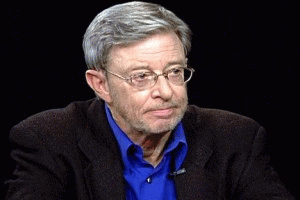Reprinted from Consortium News
It may be fitting that the U.S.-funded Radio Liberty would be the latest media outlet to join in the bashing of an American academic who dares to disagree with U.S. policies on Ukraine, which have included supporting a 2014 coup that ousted the elected president and installing a new regime in which neo-Nazis play a prominent role. After all, Radio Liberty has a history of cuddling up to Nazis.
On May 6, a Radio Liberty pundit named Carl Schreck joined the Official Washington herd in demeaning Russian scholar Stephen Cohen as "a Putin apologist" who, Schreck said, was once "widely seen as one of the preeminent scholars in the generation of Sovietologists who rose to prominence in the 1970s, [but] Cohen these days is routinely derided as Putin's 'toady' and 'useful idiot.'"
In that sense, Schreck's reliance on vitriol rather than reason was typical of the "group think" prevalent across the U.S. mainstream media. But Radio Liberty does have a special history regarding Ukraine, including the use of Nazi sympathizers during the ramping up of the Cold War propaganda by Ronald Reagan's administration in the 1980s.
In early 2014, when I was reviewing files at the Reagan presidential library in Simi Valley, California, I stumbled onto an internal controversy over Radio Liberty's broadcasts of commentaries into Ukraine from right-wing exiles. Some of those commentaries praised Ukrainian nationalists who sided with the Nazis in World War II as the SS pursued its "final solution" against European Jews, including the infamous Babi Yar massacre in a ravine outside Kiev.
These RL propaganda broadcasts provoked outrage from some Jewish organizations, such as B'nai B'rith, and individuals including conservative academic Richard Pipes, prompting an internal review. According to a memo dated May 4, 1984, and written by James Critchlow, a research officer at the Board of International Broadcasting, which managed Radio Liberty and Radio Free Europe, one RL broadcast in particular was viewed as "defending Ukrainians who fought in the ranks of the SS."
Critchlow wrote, "An RL Ukrainian broadcast of Feb. 12, 1984 contains references to the Nazi-oriented Ukrainian-manned SS 'Galicia' Division of World War II which may have damaged RL's reputation with Soviet listeners. The memoirs of a German diplomat are quoted in a way that seems to constitute endorsement by RL of praise for Ukrainian volunteers in the SS division, which during its existence fought side by side with the Germans against the Red Army."
Harvard Professor Pipes, who was an adviser to the Reagan administration, also inveighed against the RL broadcasts, writing -- on Dec. 3, 1984 -- "the Russian and Ukrainian services of RL have been transmitting this year blatantly anti-Semitic material to the Soviet Union which may cause the whole enterprise irreparable harm."
Though the Reagan administration publicly defended RL against criticism, privately some senior officials agreed with the critics, according to the documents. For instance, in a Jan. 4, 1985, memo, Walter Raymond Jr., a top official on the National Security Council, told his boss, National Security Adviser Robert McFarlane, that "I would believe much of what Dick [Pipes] says is right."
That three-decade-old dispute over U.S.-sponsored radio broadcasts underscored the troubling political reality of Ukraine, which straddles a dividing line between people with cultural ties oriented toward the West and those with a cultural heritage more attuned to Russia. Since the Feb. 22, 2014 coup that ousted President Viktor Yanukovych, some of the old Nazi sympathies have resurfaced.
For instance, on May 2, 2014, when right-wing hooligans chased ethnic Russian protesters into the Trade Union Building in Odessa and then set it on fire killing scores of people inside, the burnt-out building was then defaced with pro-Nazi graffiti hailing "the Galician SS" spray-painted onto the charred walls.
Later, some of Ukraine's right-wing "volunteer" battalions sent to eastern Ukraine to crush the ethnic Russian resistance sported neo-Nazi and Nazi emblems, including Swastikas and SS markings on their helmets. [See Consortiumnews.com's "Seeing No Neo-Nazi Militias in Ukraine."]
Targeting Cohen
But anyone who detects this reality can expect to confront insults from the mainstream U.S. media and U.S. government propagandists. Professor Cohen, 76, has borne the brunt of these ad hominem attacks.
One of the ugliest episodes came when the Association for Slavic, East European and Eurasian Studies joined the bash-Cohen mob. The academic group spurned a fellowship program, which it had solicited from Cohen's wife, The Nation's editor Katrina vanden Heuvel, because the program's title included Cohen's name.
"It's no secret that there were swirling controversies surrounding Professor Cohen," Stephen Hanson, the group's president, told the New York Times.
(Note: You can view every article as one long page if you sign up as an Advocate Member, or higher).






